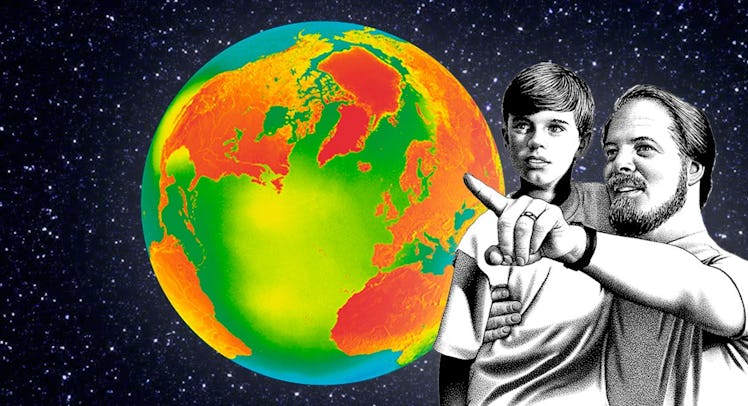5 Bummer-Free Ways to Talk About Environmental Issues with Kids
There are a few ways to talk about the changing world without bumming out kids.

The large majority of Americans want kids to learn about climate change. The problem? Pollution, deforestation, and the loss of endangered species are all total bummers so making environmentalism — or conversations about nature generally — into doomsday contemplation risks turning kids off to the idea of nature, full stop. This is how kids become disconnected from the issues — by accepting powerlessness before they have an opportunity to become passionate advocates for change.
In a best-case scenario, planning ahead is key when having these conversations. A premature or overly pessimistic discussion about how we’re collectively wrecking the natural world can leave kids feeling disillusioned and disempowered. But we shouldn’t lie to them, either. After all, the world we’re leaving them with will have all of the problems that we have created. So we need to do all we can to keep them optimistic — and informed.
Here are five ways to respond to a child’s ecological curiosities without totally bumming them out
Be patient.
Before you break out the Al Gore-styled climate charts, make sure you really understand what your kid is interested in hearing. They may not be seeking factual information. Children need to process newly discovered issues. If their questions are mostly expressions of anxiety, simply encourage them to express those fears. When you do respond, let them know that their anxieties, anger, and sadness are all normal reactions.
Spend time outdoors.
Only one in ten kids regularly spend time outdoors. That’s a problem. Before we can expect our kids to understand large-scale environmental concerns, they need to form a connection with nature. Immersing children in the natural world, and educating them about nature, is the first step for them to appreciate the complex systems that maintain nature’s delicate balance.
Introduce kids to the outdoors, teach them to enjoy it, love it, feel comfortable in it. Once all that’s accomplished, they’ll be more motivated to practicing sustainability.
Show them what their peers are doing.
What better way to inspire hope than for kids to listen to fellow kids who are motivated to take action? The Alliance for Climate Education, a youth-led environmental education group, released a video series this month profiling youth who are directly affected by climate change. It received nearly half-million views in its first week. After explaining the threats of climate change, the narrator empowers viewers to become change makers. “We’re going to show you the world as it is — and the world you can create,” he said. “This is our climate, our future.”
Do what their teachers may not.
While a national survey of science teachers found an uptick in environmentally themed lesson plans, many of these teachers are getting the facts wrong. A large number of teachers are telling students that climate change is still debated among scientists. It’s not.
No cumulative curriculum exists for children on topics such as climate change. Plus, scientific advances regularly outpace school textbooks and many teachers’ own training.
Parents can help by talking to their kids with the assistance of well-researched, age-appropriate lesson materials. This spring, a group of earth scientists associated with Cornell University are raising funds to send their new book The Teacher-Friendly Guide to Climate Change to every middle school and high school in the country.
5. Play (certain) video games.
Seriously, we need to make environmental issues fun for kids. If a heart-to-heart talk isn’t your thing, there are plenty of video games to help. I’m not suggesting you break out Captain Planet and the Planeteers on Classic Nintendo. Lots of age-appropriate games are educational and instructional, teaching valuable lessons on resource conservation, recycling, and emergency preparedness: They can relive Henry David Thoreau embracing a subsistence lifestyle in Walden. Get ready for the rise of severe hurricanes with NOAA’s Weather Preparedness Adventure. Become a “green ninja” and learn how personal decisions impact the environment in Carbon Runner.
Above all else, keep in mind that even the most intractable problems are not impossible to solve. We have the tools and knowledge. We just need the willpower and resolve.
Ben Block is the founder of Climate Dads, a new digital platform for fathers concerned about the risks posed by climate change.
This article was originally published on